Jennifer Becton's Blog, page 43
June 20, 2012
WP Paperbacks Now Available Internationally!
 I’m very excited to announce that Whiteley Press titles will now be available through Amazon’s international family of websites! The paperbacks in the Southern Fraud Thriller series and the Personages of Pride and Prejudice collection will soon be available in English in the UK, France, Germany, Spain, and Italy.
I’m very excited to announce that Whiteley Press titles will now be available through Amazon’s international family of websites! The paperbacks in the Southern Fraud Thriller series and the Personages of Pride and Prejudice collection will soon be available in English in the UK, France, Germany, Spain, and Italy.
I’m pleased that CreateSpace has made this option available, and I’m thrilled that I’ll get to share my books with a wider audience.
June 18, 2012
At Fault: The Real Work Begins
Last night, I completed the first draft of At Fault! I was riding in a truck and listening to “Freebird” at the time. I thought it was appropriate given the Southern setting of the book.
Allow me to take a moment to celebrate.
Okay, so I didn’t just save Christmas, but I thought the Snoopy dance was appropriate.
Now that the celebration is finished, it’s time to get to the real work: rewriting and editing.
I should refer to my handy pie chart: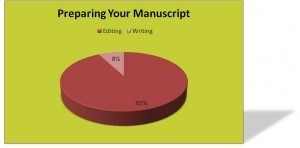
As Laura Daley, my writing partner on Riding Fear Free and I discussed recently, writers rewrite. The first draft is called a “rough” draft for a reason. As my husband says, you have to have the rock before you can make Rock Soup. You’ve got to have something in the pot to work with, to invite the interest and talents of your readers and editors so that you can produce your best work (or soup) possible.
For the next few months, I’ll be adding the interesting, tasty ingredients to At Fault and getting the input of professional criticizers…er editors. And then, it will be read to share with everyone. I’m so excited!
In the meantime, Laura and I will be finishing up Riding Fear Free and releasing it sometime around July 15. If you are a fearful rider, help is on the way!
June 15, 2012
Price Matters More
Today I’m at Indie Jane to talk about yet further changes to Amazon’s sales algorithm. Please join us to discover details about why a higher price point and fewer sales may actually improve your rank and visibility.
June 14, 2012
Earning a Living?
This little ditty revealed itself to me recently: Self-publishing: under 10% of authors earn living, and if you are an indie publisher, you should read it. According to these findings, you have the greatest chance of success if you are a 40-year-old female with an agent who has never been rejected by traditional publishers or who has previously been published and who writes romances. It also states that half the respondents failed to earn $500 in royalties in 2011.
Sounds bad, right?
There are many ways I could take this blog response, but I will focus on this question: in comparison to what? If half of all indie authors only earned less than $500 in 2011, then how does that compare to trad-pubbed authors? If only 10 percent of indie authors earn a living at writing, then how does that compare to trad-pubbed authors? Ten percent would indeed be bad if 100 percent of trad-pubbed authors earned a living. But do they?
I would like to cite some numbers that put this into perspective for me. From the Author’s Guide to Publishing and Marketing by Tim Ward and John Hunt, which was published in 2009:
In a survey of 1.2 million books in the US,
950,000 sold fewer than 100 copies
Another 200k sold fewer than 1,000
25k sold 5,000
Fewer than 500 sold 100,000
10 sold 1 millionAverage sale: 500 copies
Five hundred was the average at the time of this survey. 500! Can you earn a living with only 500 sales on traditional royalties? I don’t think so.
So where exactly in that scale does earning a living start? Let’s just say it’s at the 5,000 sales mark for kicks and grins, and this is being extremely generous to account for other factors and differences in the surveys. That means out of 1,200,000 books in this survey, 50,000 were earning their authors a living at the time. What percentage is that?
Four.
But let’s look at some more numbers. What about here, which is a survey of “typically experienced writers – that is, with multiple books published, with an agent, and boasting both overseas and domestic sales.” These 321 respondents had published more than 1,000 books among them, most of which were produced by one of the Big 6. You can find the full dataset here.
And one more stat before I continue. According to this NYT essay, only 3 out of 10 books earn back their advances.
Okay, back to the survey of authors.
When asked about advances, here is the response:
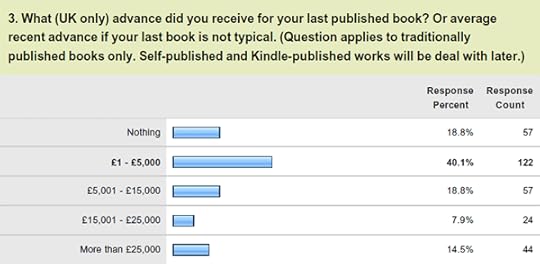
Most authors were paid an advance equaling less than $7,755 in today’s dollars. Can they live on that? If you move to the next bracket, they were paid $23,265. That’s income barely above the poverty level in the US in 2011 for a four-person family. So that means that 22.4 percent of these writers, most of which are published by the Big 6 and considered successful are making a living for one year off their advance, and according to the stats in the NYT article, which may be low considering the set of those who were polled in this survey, only 3 out of 10 will earn anything beyond that. And that doesn’t account for the rest of the authors out there who are published traditionally, but by smaller presses.
When you read the indie stats in comparison to traditional stats that are available online, two things become clear. First, the writers of that article wanted you to assume that the results of their survey proved something negative about indie pubbing. Did they? I’d say that 10 percent of indie authors earning a living is pretty damn good in comparison to the data I found.
Second, traditional authors may have prestige, but they also have to live off something else: money. It’s a fact of life.
Note: I could not find a hard statistic on how many traditionally published authors are earning a living. I crunched these numbers myself. Remember I’m a writer not a mathematician, so don’t go citing these numbers until you verify them yourself.
June 13, 2012
On Being a Bit Like Nora Roberts
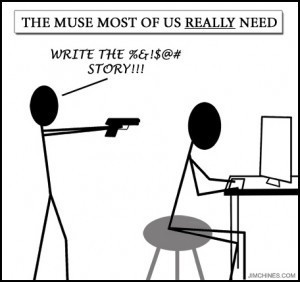
via Jim Chines
My father-in-law once asked me what I would do when the ideas for books stopped coming. Now, I’m not going to lie by saying I blinked at him innocently and said, “I never thought about it.”
I have thought about it and about the creative process quite a lot. I have wondered about that very question. What might happen if I never had another book idea?
But after careful consideration, I have decided to reject the premise of the question. Let me break it down, and then I’ll get to Nora Roberts, I promise.
That question seems to assume that book plots spontaneously appear in my head now. I’ve already blogged about my opinions on muses, and I don’t believe any author has a supernatural connection to a watery tart who beams bestsellers to their brain. Books are hard work, and the creative process is a process, not magic.
I’ve never thought of myself as “creative.” And I am certain it’s because of the way “creativity” was used in school. Creative people wore hippie skirts, talked about their feelings, and wrote poetry. I did none of these things. And when a teacher decided we were going to try some “creative writing” that had to be at least 500 words in length, use 20 vocabulary words, and deal with Hamlet’s feelings for Yorick, well, I wanted to put my fist through a wall. How is that creative, even by their own definition of creativity? (And don’t even get me started on the assignment to invent a new product in science class. “Sit down and invent something useful using the following parameters…. Go.” I’m sorry. That’s not how it works.)
What ought to be taught as “creative writing” is the full writing process, from first draft to final edits. Because writing is hard work, and from start to finish, a book changes a great deal. Writing requires a decent vocabulary, a good understanding of story structure, an ear for dialogue, and the ability to organize large amounts of information, not to mention logic, dedication, and, yes, a bit of art. In short, writing is work. Coming up with the ideas for books is work. It will always be hard work.
Enter Nora Roberts. Since 1981, Nora has written 209 novels. Two hundred and nine! (11010001 in binary for you geeks out there). As of 2011, her books have been on the NYT Bestsellers List for 861 weeks, 176 of which were in the number 1 slot. Her 200th book, The Witness received 4.5 out of 5 stars from 327 reviewers on Amazon, so she’s still pleasing her audience 30 years and 200 books later.
Nora Roberts hasn’t run out of ideas, and the quality of her books has not declined over her career. But she is still a hard worker. According to her website, she writes 8 hours a day. That’s every day of the week, including holidays. I don’t think she sits around mooning over what might happen if she runs out of ideas. She keeps working, keeps refining, keeps writing.
Eight hours every day of the year is an incredible amount of dedication. That’s why I say I’d like to be a bit like Nora Roberts. I know enough about myself to be certain that I could not survive and thrive on that rigorous work schedule, but I’m okay with that. I won’t have Nora’s level of output, or likely her level of success, but she is a good example of what it takes to lead a creative life: hard work and dedication. In that, I’d like to be a lot like her. (But I wouldn’t mind her success either!)
June 7, 2012
Summer Thriller Sale!
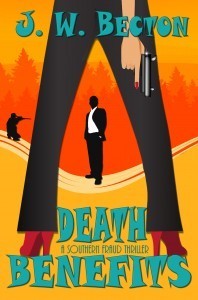
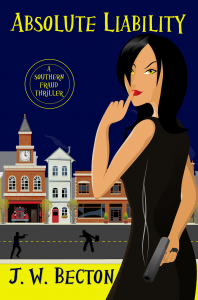 For a limited time, both books in the Southern Fraud Thriller series will be on sale. The price has already changed at BN and Amazon.
For a limited time, both books in the Southern Fraud Thriller series will be on sale. The price has already changed at BN and Amazon.
Absolute Liability is $.99 at Amazon, or you can borrow it free if you are part of the Kindle Owners’ Lending Library program.
Death Benefits is available at Amazon, BN, and Smashwords (in any ebook format) for only $1.99. It will also soon be heading to Apple and Kobo and perhaps other retailers too.
Have a great summer, and happy reading!
June 5, 2012
Let’s Go, Kobo!
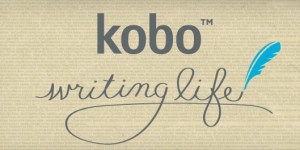 Kobo’s announcement today of their new self-publishing platform called Writing Life shows us the value of real competition in the marketplace and, strangely enough, explains why I don’t think Amazon is the devil for launching its Select program.
Kobo’s announcement today of their new self-publishing platform called Writing Life shows us the value of real competition in the marketplace and, strangely enough, explains why I don’t think Amazon is the devil for launching its Select program.
Sure, Amazon came out of the gate aggressive with its Select program in that it is the largest ebook retailer and in order to participate, authors had to sell their ebooks exclusively at Amazon for the duration of their enrollment. Heck yes, it was a ballsy move, and it was an attempt to corner the ebook market. And that’s exactly what they should have done. They are competing!
As a result, that means competitors have to step up their game too: offer something better, freer, and more profitable than authors can find at Select. Try to win me as an author. Try to win readers as shoppers. Make me happy to sell at your store or shop there. And Kobo’s announcement is a step in that direction.
Let me explain my take.
First, competition is good for everyone. Competition means everyone is looking for ways to do something or produce something better, faster, and cheaper. What has essentially happened is that Kobo, who is admittedly not nearly the power player that Amazon, Apple, and BN are, has said, “Hey, we think we can deal directly with authors in a better, faster, and cheaper way, and BONUS! We’re not going to require exclusivity or a certain type of computer to do it. Oh, and our search algorithms aren’t going to suck, and you can give your book away free if you want.” That beats the heck out of Amazon Select, BN, and Apple if it all works out right.
A bit of a digression here, but competition isn’t about killing rivals or beating someone. It’s about constantly challenging each other to improve. Okay, I feel better having said that.
Second, freedom is good for everyone. The more choices we have as authors about where and how to sell our books and at what price, the better it is for us and our readers, who will be able to find what they want where they want to buy it.
Now, let me cut through my glee here and say that Kobo’s actual success will depend on a lot of factors, not the least of which is actually implementing the promises of their program and their ability to market their store to readers and help authors market their books to shoppers.
What excites me about this is the opportunity for indie publishing to grow, improve, and change as a result of Kobo’s announcement and those that are likely to come in the future. My hope is that other companies will follow suit, eliminating the need for authors to use third-party distributors, who slow the process unnecessarily and only serve as a distancing agent between writers and readers.
This leaves me with lots of questions:
How will Amazon, BN, and Apple respond? Will they improve their platforms by making them freer and more profitable, or is Kobo not enough of a power player to warrant their attention yet?
What about Smashwords? Will they also improve as a result of another vendor going directly to writers?
And if I give my book away free on Kobo, will Amazon, BN, and Apple match the price? And what will that mean for my algorithms? Will I get the same visibility boost?
To me, this is exciting and fun! Change means new opportunities, and even if this isn’t the be-all-end-all, it’s at least a step in the right direction. I’d love to hear your thoughts on this too!
May 31, 2012
Death Benefits Is Back on BN
 When it comes to book sales–and several other things, like calories and weight loss–I try to look at everything in terms of numbers. Numbers are not emotional; they’re not about feelings. They’re just numbers. Facts.
When it comes to book sales–and several other things, like calories and weight loss–I try to look at everything in terms of numbers. Numbers are not emotional; they’re not about feelings. They’re just numbers. Facts.
If I normally eat a 2,000 calorie diet and switch to a 1,500 calorie diet, I will decrease my weight by 1 pound per week. Looking at diet in terms of numbers takes out the emotional factor for me. It’s just mathematics.
I try to look at book sales the same way. If I sell 100 books at Store X and 1 at Store Y, I have reached more readers and earned more money at Store X. Therefore, Store X provides me both greater readership and more profit. As a result, I can either focus my attention on the profitable store or I can try to increase my visibility at Store Y.
Logic tells me that the best thing to do would be to try to increase sales at Store Y in order to maximize my exposure, thereby earning more money and pleasing more readers. However, not all stores are created equal in that the internal marketing–customers who bought also bought lists and other tools–are just flat out better at one location than another. And I have also found that there are varying options available for external marketing with a focus on a particular store. So what I’m basically trying to say here is that not all stores are created equal.
If you haven’t figured it out by now, I’m speaking about the Select program at Amazon versus selling at all other venues. Since entering all my books in Select, they have consistently earned more on lends alone than they did at all other sales venues combined. In addition, my book sales at Amazon also improved. So that’s more sales, plus the lends. Therefore, I not only earned more money but also reached more readers on Select than I did at all other sales venues combined.
Let me restate that. If I loan more books at Amazon than I sold at all other retailers combined, then I reached more readers. And that seems totally counter-intuitive. More venues should equal more exposure. Only sometimes it doesn’t.
Here’s my quandary: I want to please ALL readers and be certain that my books are available at all possible venues and in all formats (and that’s why I don’t use DRM), but it doesn’t always make sense, not only from a financial standpoint but from a reader base standpoint. My readership expanded on Select.
Frankly, I hate that the choice exists, but it does, and there’s nothing I can do about it now. So my plan is to rotate my books on and off the Select program, making them available for a certain time period at all retailers. If something changes, and the books take off at other retailers, great! They stay. If not, math tells me to rotate them back on Select.
So my first book has rotated off Select. Death Benefits is now available again on Nook and will soon be on Smashwords too.
May 22, 2012
Writing for Yourself
One of the most difficult aspects of being a published author is remembering my audience and yet also writing to please myself. I always want to put out books that people enjoy reading, but if I think too much about that, then my brain seizes up and I can’t write a word.
That can’t be good.
So I am writing this blog post as a reminder to myself as I dig back into At Fault (SF 3) that the first draft is just for me. I can fill it full of mistakes and outrageous plot twists. I can write the most ridiculous comedy scenes, the most gratuitous love scenes, or the most violent criminal perspectives I want. I can even have Vincent shirtless for the entire novel if I want.
Hmmm…that idea might have merit.

To shirt or not to shirt?
No matter what, the first draft is for my eyes only. But the rewrites are for the readers. That’s when I’ll make sure everything is balanced and paced correctly. I’ll get rid of the corny scenes and tone down the romance so it has just the right about of tension and longing. I may even let Vincent put his shirt back on.
Or maybe not.
We’ll see.
But I think it’s important to remember why writers started writing in the first place. It’s because we love to read, and we wanted to write something that made us happy. And the way I see it, I’m not so different in my reading tastes than everyone else. I like action, humor, and romance just as much as the next reader. So I figure if I write to please myself and then edit it to make sure its intelligible, someone else may like it too.
So off I got back to Mercer, Georgia, with Julia and Vincent, who may or may not be wearing a shirt.
May 18, 2012
Algorithms: Insult Generating and Otherwise
I’ve spend the entire week formatting the paperback ARC of Riding Fear Free, and that has made me a bit giddy. So when it came time for me to write my monthly post for Indie Jane, I just went with my zany mood and wrote about booksellers’ algorithms. What does this have to do with Better off Ted? Find out.



